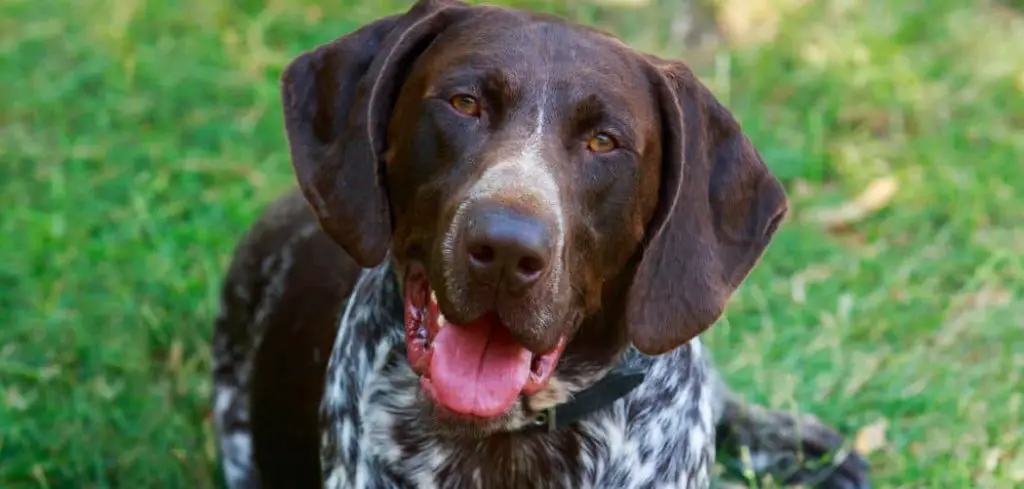It’s alarming to see your dog panting and licking their lips more than usual, especially if it happens suddenly or persists for long periods. These behaviors can signal anything from mild discomfort to more serious underlying health problems.
We outline the common causes of a dog panting and licking its lips excessively, what you can do at home, and when to seek veterinary help.
Dog Panting and Licking Lips Excessively — Why It Happens
When a dog pants heavily and constantly licks their lips, it’s often a sign of stress, nausea, or pain. It might be related to overheating, gastrointestinal upset, dental problems, or even anxiety. Some dogs lick their lips excessively as a self-soothing mechanism when they’re nervous or nauseous.
Others do it when experiencing mouth discomfort or digestive distress.
While not every case is an emergency, these signs should not be ignored, especially if they persist or worsen.

Common Causes of Dog Panting and Licking Lips Excessively
Heatstroke
Heatstroke is a life-threatening condition that can cause both panting and lip licking in dogs.
When a dog’s body overheats, they pant excessively to try to cool down. At the same time, they may lick their lips due to dehydration or dry mouth.
Dogs may also appear restless, weak, or uncoordinated.
This is a medical emergency, especially in warm weather or after intense activity.
Short-nosed breeds, overweight dogs, and older pets are particularly vulnerable.
Nausea
Nausea is one of the most common reasons dogs lick their lips repeatedly.
It may be caused by gastrointestinal issues like indigestion, gastritis, or even ingestion of something toxic.
Panting can accompany nausea, especially if your dog feels anxious or uncomfortable.
You might also see drooling, vomiting, or a reluctance to eat.
It’s important to monitor for any signs of worsening stomach upset or dehydration.
Read more: Dog Panting Excessively (Here’s why)
Anxiety or Stress
Dogs often pant and lick their lips excessively when they are nervous or fearful.
Common triggers include thunderstorms, fireworks, car rides, or changes in environment.
These actions are part of a stress response and may be accompanied by whining, hiding, pacing, or yawning.
While not always a medical emergency, chronic anxiety should be addressed to improve your dog’s well-being.
Long-term stress can even contribute to other health issues if left untreated.
Dental Problems
Oral pain can cause dogs to pant and lick their lips frequently.
Dental issues like infected gums, loose teeth, or oral abscesses may make chewing uncomfortable and lead to excessive salivation.
Dogs may lick to relieve the sensation of pain or irritation in their mouths.
You may also notice bad breath, drooling, or changes in eating habits.
Prompt dental care is essential to prevent worsening infections or discomfort.
Toxic Ingestion
If a dog licks or eats something harmful, they may start licking their lips and panting rapidly.
This can happen with household cleaners, plants, human medications, or spoiled food.
You might see vomiting, diarrhea, tremors, or unusual behavior depending on the toxin.
Rapid treatment is crucial — don’t wait to see if symptoms improve.
Call your vet or poison control immediately if you suspect poisoning.
Pain or Discomfort
Dogs often lick their lips and pant more when they are in pain.
This could be due to injury, arthritis flare-ups, abdominal pain, or internal illness.
Because dogs are good at hiding pain, subtle signs like these should be taken seriously.
They may also avoid movement, seem withdrawn, or whimper.
Getting to the root cause quickly helps prevent worsening of the underlying issue.
What to Do If Your Dog Is Panting and Licking Lips Excessively
Start by assessing the environment — if it’s hot, move your dog to a cooler space and offer water.
If your dog seems nauseous, avoid feeding for a few hours and monitor for vomiting or other signs. A bland diet might be introduced later if symptoms improve.
For stress-related causes, provide a calm, quiet environment and consider calming aids like pheromone diffusers or anxiety wraps.
Check your dog’s mouth for signs of dental pain, swelling, or foreign objects. If anything seems off, a vet visit is needed.
Avoid giving human medications or attempting home remedies unless directed by your vet — some can be toxic to dogs.
When to Call or Visit Your Vet
Seek veterinary help immediately if your dog:
Shows signs of heatstroke (collapse, bright red gums, vomiting)
Vomits repeatedly or cannot keep water down
Appears to be in severe pain or distress
Has pale gums, labored breathing, or a bloated abdomen
Ingested something potentially toxic
Even if the symptoms seem mild, it’s worth calling your vet if your dog continues panting and licking lips for more than a few hours.
Catching issues early can prevent more serious health consequences.
Read more: Dog Panting and Licking Excessively (Is it an emergency?)
Key Takeaway
Excessive panting and lip licking in dogs can point to a range of issues from stress and nausea to serious health threats.
Trust your instincts — if your dog seems off, it’s always better to investigate early rather than wait.
By observing your dog’s behavior closely and acting quickly when something’s wrong, you can keep them safe, comfortable, and healthy.
